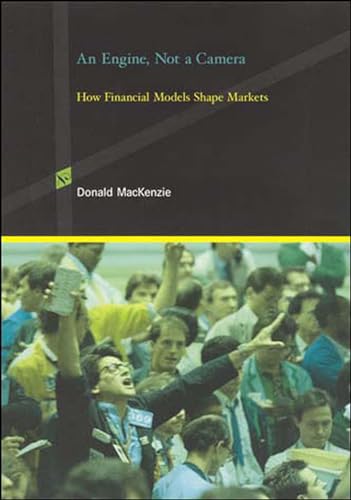An Engine, Not a Camera: How Financial Models Shape Markets (Inside Technology Series)
Donald Mackenzie
From
WorldofBooks, Goring-By-Sea, WS, United Kingdom
Seller rating 5 out of 5 stars
![]()
AbeBooks Seller since 16 March 2007
About this Item
Description:
The book has been read, but is in excellent condition. Pages are intact and not marred by notes or highlighting. The spine remains undamaged. Seller Inventory # GOR006676484
Synopsis:
In An Engine, Not a Camera, Donald MacKenzie argues that the emergence of modern economic theories of finance affected financial markets in fundamental ways. These new, Nobel Prize-winning theories, based on elegant mathematical models of markets, were not simply external analyses but intrinsic parts of economic processes.
Paraphrasing Milton Friedman, MacKenzie says that economic models are an engine of inquiry rather than a camera to reproduce empirical facts. More than that, the emergence of an authoritative theory of financial markets altered those markets fundamentally. For example, in 1970, there was almost no trading in financial derivatives such as "futures." By June of 2004, derivatives contracts totaling $273 trillion were outstanding worldwide. MacKenzie suggests that this growth could never have happened without the development of theories that gave derivatives legitimacy and explained their complexities.
MacKenzie examines the role played by finance theory in the two most serious crises to hit the world''s financial markets in recent years: the stock market crash of 1987 and the market turmoil that engulfed the hedge fund Long-Term Capital Management in 1998. He also looks at finance theory that is somewhat beyond the mainstream—chaos theorist Benoit Mandelbrot''s model of "wild" randomness. MacKenzie''s pioneering work in the social studies of finance will interest anyone who wants to understand how America''s financial markets have grown into their current form.
About the Author: Donald MacKenzie is Professor of Sociology (Personal Chair) at the University of Edinburgh. His books include Inventing Accuracy (1990), Knowing Machines (1996), and Mechanizing Proof (2001), all published by the MIT Press. Portions of An Engine, not a Camera won the Viviana A. Zelizer Prize in economic sociology from the American Sociological Association.
Bibliographic Details
Title: An Engine, Not a Camera: How Financial ...
Publisher: The MIT Press
Publication Date: 2008
Binding: Paperback
Condition: Very Good
Top Search Results from the AbeBooks Marketplace
An Engine, Not a Camera: How Financial Models Shape Markets (Inside Technology)
Seller: HPB-Red, Dallas, TX, U.S.A.
Paperback. Condition: Good. Connecting readers with great books since 1972! Used textbooks may not include companion materials such as access codes, etc. May have some wear or writing/highlighting. We ship orders daily and Customer Service is our top priority! Seller Inventory # S_418054472
Quantity: 1 available
An Engine, Not a Camera: How Financial Models Shape Markets
Seller: Underground Books, ABAA, Carrollton, GA, U.S.A.
Paperback. Condition: Good. Paperback. 9" X 6". x, 377pp. Mild rubbing, bumps, and shelf wear to covers, corners, and edges of paper wraps. Remnants of removed sticker to rear cover. Remainder mark to bottom edge of text block. Pages are clean and unmarked. Binding is sound. ABOUT THIS BOOK: In An Engine, Not a Camera, Donald MacKenzie argues that the emergence of modern economic theories of finance affected financial markets in fundamental ways. These new, Nobel Prize-winning theories, based on elegant mathematical models of markets, were not simply external analyses but intrinsic parts of economic processes. Paraphrasing Milton Friedman, MacKenzie says that economic models are an engine of inquiry rather than a camera to reproduce empirical facts. More than that, the emergence of an authoritative theory of financial markets altered those markets fundamentally. For example, in 1970, there was almost no trading in financial derivatives such as "futures." By June of 2004, derivatives contracts totaling $273 trillion were outstanding worldwide. MacKenzie suggests that this growth could never have happened without the development of theories that gave derivatives legitimacy and explained their complexities. MacKenzie examines the role played by finance theory in the two most serious crises to hit the world's financial markets in recent years: the stock market crash of 1987 and the market turmoil that engulfed the hedge fund Long-Term Capital Management in 1998. He also looks at finance theory that is somewhat beyond the mainstream‚"chaos theorist Benoit Mandelbrot's model of "wild" randomness. MacKenzie's pioneering work in the social studies of finance will interest anyone who wants to understand how America's financial markets have grown into their current form.(Publisher). Seller Inventory # 14813
Quantity: 1 available
An Engine, Not a Camera: How Financial Models Shape Markets (Inside Technology)
Seller: SecondSale, Montgomery, IL, U.S.A.
Condition: Good. Item in good condition. Textbooks may not include supplemental items i.e. CDs, access codes etc. Seller Inventory # 00081692451
Quantity: 1 available
An Engine, Not a Camera: How Financial Models Shape Markets (Inside Technology)
Seller: thebookforest.com, San Rafael, CA, U.S.A.
paperback. Condition: New. Well packaged and promptly shipped from California. Partnered with Friends of the Library since 2010. Seller Inventory # 1LAUHV002SWH
Quantity: 2 available
An Engine, Not a Camera
Seller: Books Puddle, New York, NY, U.S.A.
Condition: New. pp. 392. Seller Inventory # 26696062
Quantity: 3 available
ENGINE NOT A CAMERA
Seller: Speedyhen, London, United Kingdom
Condition: NEW. Seller Inventory # NW9780262633673
Quantity: Over 20 available
Engine, Not a Camera : How Financial Models Shape Markets
Seller: GreatBookPrices, Columbia, MD, U.S.A.
Condition: As New. Unread book in perfect condition. Seller Inventory # 5636414
Quantity: Over 20 available
Engine, Not a Camera : How Financial Models Shape Markets
Seller: GreatBookPrices, Columbia, MD, U.S.A.
Condition: New. Seller Inventory # 5636414-n
Quantity: Over 20 available
Engine, Not a Camera : How Financial Models Shape Markets
Seller: GreatBookPricesUK, Woodford Green, United Kingdom
Condition: New. Seller Inventory # 5636414-n
Quantity: Over 20 available
An Engine, Not a Camera How Financial Models Shape Markets Inside Technology Series
Seller: PBShop.store UK, Fairford, GLOS, United Kingdom
PAP. Condition: New. New Book. Shipped from UK. Established seller since 2000. Seller Inventory # GB-9780262633673
Quantity: 15 available

